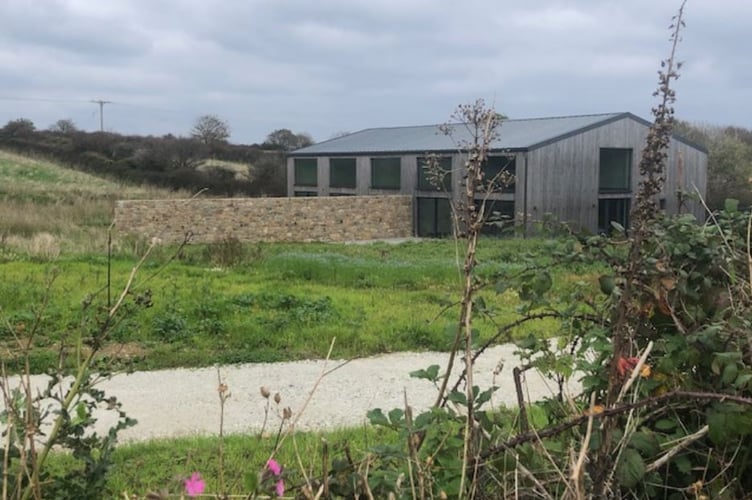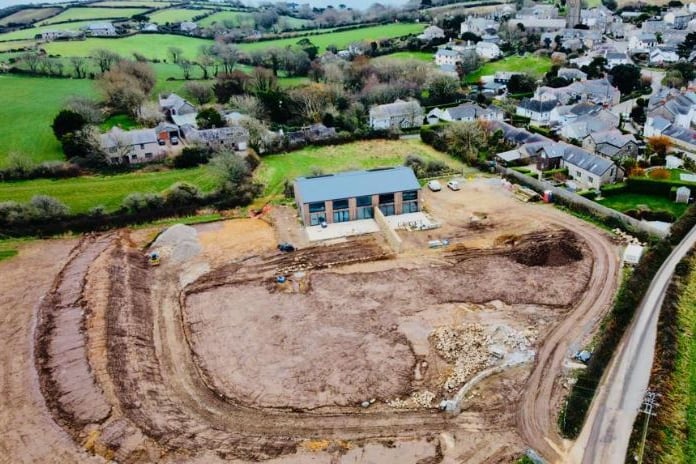CORNWALL Council has been slammed by angry villagers for not carrying out enforcement action after unauthorised work was carried out during a barn conversion.
There has been an 18-month-long saga of retrospective applications, refusals and now an appeal by the developer being dismissed by a government inspector.
In February 2024 we reported concerns by incensed villagers in Paul, near Penzance, that a huge barn conversion which dwarfs neighbouring homes was a planning “apocalypse” which had breached legislation. Following repeated protests by locals, Cornwall Council said it had investigated the matter and was taking action.
However, local opponents of the work say that since then the situation has worsened and the council has still not carried out enforcement action. They are demanding the local authority returns the land to how it was, citing the controversy surrounding Captain Sir Tom Moore’s family home which resulted in Central Bedfordshire Council demolishing an unlawful building.
In 2021 an agricultural barn with surrounding fields in the village, between Mousehole and Newlyn, was bought by a developer and a Class Q barn conversion went ahead. The Class Q legislation allows owners to convert redundant agricultural buildings into dwellings without the need to follow normal planning procedures.
However, the Class Q regulations and local planning policies concerning expansion of housing development into agricultural land were “totally ignored”, according to angry neighbours, and a large area of land was pulled into the development, including the building of walls and a new engineered drive which were unauthorised.
After our story was published, a retrospective planning application for the work was lodged with Cornwall Council in March 2024, which was refused. Negotiations then took place between the council and the developer, with an understanding that the latter would put things right.

A spokesperson for a group of residents, who are up in arms against the unauthorised work, said: “Nothing at all was ‘put right’ and instead the completed half of the converted barn was put on the market at over £1-million.”
Cornwall Council then started enforcement action. However, that action was nullified when the developer submitted another retrospective application to legalise the unauthorised work on October 2024. Again, the council refused it.
Mr A Macaulay then appealed the decision and a planning inspector visited the site in August this year. The appeal for the “retention and completion of two access drives on the site, retention of field and minor extensions to garden areas” was dismissed by the Planning Inspectorate last month.
Local residents are now urging Cornwall Council to act decisively to enforce, restoring the engineered ground to its original state as an agricultural field. They believe that, without enforcement, the continued existence of an unauthorised second drive automatically changes the status of the enclosed land to potentially residential.
A spokesperson for residents said: “We need to thank Cornwall Council’s planning department who throughout the whole saga continued to resist this determined browbeating by the developers and their planning agent. There was some risk in this because had the Planning Inspectorate’s decision gone the other way then the council could well have had to pay out considerable costs.
“There is, however, serious concern that Cornwall Council enforcement has dragged its feet throughout and will again be very slow to act. Cornwall Council enforcement should act very quickly here as Central Bedfordshire Council did with the unauthorised extension to the Captain Tom memorial building. When the developers’ appeal was dismissed the council promptly demolished the building.”
A number of residents in and around Paul spoke to us about their concerns, but none wanted to be named. One of them said: “What’s gone on at this site is shocking. The Planning Inspectorate has thrown out the developer’s appeal so the relevant land must be returned to its original state, infilling the unauthorised extra driveway and demolishing the walls that have been built. If there is a refusal to do this then Cornwall Council must now finally step in to enforce.”
Another added: “I am deeply concerned that despite the fact that a second planning appeal was refused for the retention of unauthorised works on the barn, no further action will be taken. I base this concern on the fact that the planning department has throughout the construction process ignored alerts of irregular activity, including bulldozers landscaping an agricultural field, building a 10ft high wall, constructing a second unplanned road and failing to plant trees.”
After contacting Cornwall Council for a response to the residents’ concerns, a spokesperson said: “The council’s planning enforcement team have noted the appeal decision and will be working with the landowner to secure a satisfactory outcome.”
This may not be the end of the saga though as a spokesperson for Cornwall Planning Group, which was the agent for the last retrospective application which went to appeal, believes the applicant may apply to the council with another altered retrospective application.





Comments
This article has no comments yet. Be the first to leave a comment.